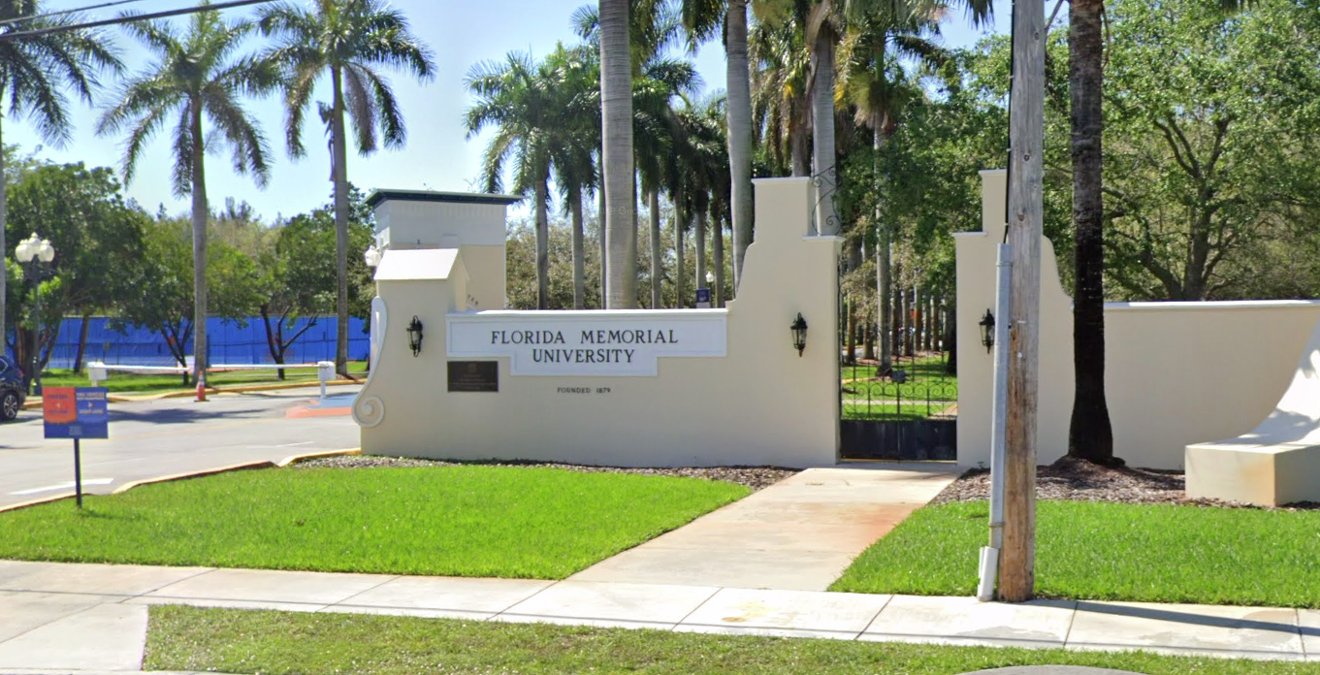At the start of the fall semester, royal blue and bright orange signs that read "Welcome, new Lions!" decorate the 44-acre Florida Memorial University (FMU) campus in Miami Gardens. On this balmy, late-summer day, a handful of backpack-toting students vie for the shade of the aging 1960s-era residence halls on the green manicured lawns. Every few minutes, the quiet grounds fill with the roaring noise of planes taking off from neighboring Miami-Opa locka Executive Airport.
Sybrina Fulton, activist and mother of Trayvon Martin, went to FMU. So did Olympic long jump gold medalist Jeffery Henderson. And Barrington Irving, the first Black pilot to fly solo around the world.
Now the 142-year-old private institution has found itself in peril. Come next September, there's a chance that this campus — South Florida's only historically Black college and universities (HBCU) — will no longer be in operation, owing to a growing list of financial issues cited by its accrediting agency, the Southern Association of Colleges and Schools Commission on Colleges (SACSCOC). In July, the Miami Times reported that FMU had been placed on yearlong probation; if the university does not adequately address its lack of "financial responsibility" and failure to comply with financial-aid program duties by June 2022, SACSCOC could revoke its accreditation.
"It's very sad to see what the university was and see where it is now," FMU alum and current Florida A&M University assistant professor Terrell Brown tells New Times. "There's a lot of history, a lot of legacy there. It would be very heartbreaking, honestly, if something were to happen to the university in terms of its accreditation."
FMU's campus was where Brown first realized his dreams. As an undergraduate, he was involved in all areas of campus life — student government, Greek life, the psychology club — before graduating in 2006 with a degree in psychology. He recalls being welcomed with open arms by the university's professors and family-like environment.
Brown says that FMU's focus appears to have shifted toward athletics. He hopes to see the university recenter its priorities in light of its probation status.
"I mean, sports, that's fine. Football is fine," Brown says. "But I do think that there needs to be a refocusing on academics, enrollment — those things need to be primary.
SACSCOC accredits colleges across 11 southern states, including 72 historically Black institutions, which have long been underfunded in comparison to their white counterparts as a result of decades of systemic racism. It and other similar bodies have been accused of discriminating against HBCUs.
As Michael Lomax, president of the United Negro College Fund, wrote in the Atlantic earlier this year, SACSCOC's accrediting standards were created for "large, wealthy, predominately white public institutions."
Lomax cites a 2020 study that found that from 2012 to 2017, SACSCOC was more than three times as likely to take adverse actions against HBCUs than against non-HBCUs. (SACSCOC did not respond to an emailed request for comment.)
The long-standing effects of losing South Florida's only HBCU would likely be devastating for the region's Black community. HBCUs have long played a crucial role in molding Black leaders and professionals. According to the United Negro College Fund, HBCUs make up only 3 percent of the country's colleges and universities, yet they enroll 10 percent of all African-American students and produce nearly 20 percent of all African-American college graduates.
Over the past two decades, six HBCUs have closed; several others remain open despite losing their accreditation.
Stripped of accreditation, FMU would lose access to federal funding and Pell Grants for students with financial need – a cohort that makes up a large portion of enrollment at HBCUs like FMU – and the diplomas of students currently enrolled in the school could become worthless.
Faculty, alumni, and students fear this probation is the death knell, following a string of troubles faced by FMU dating as far back as the 1970s — from financial woes to mounting lawsuits to declining enrollment. In October 2020, the university's athletic director resigned amid allegations of sexual misconduct. A year earlier, a student sued the university for negligence, alleging that lax dorm security helped her rapists escape. Two weeks after that lawsuit was filed, two men were killed in a shooting on campus.
The university's troubles have been exacerbated by falling enrollment. In the 2009-10 academic year, 2,287 students were enrolled at FMU. Over the ensuing years, enrollment shrank by 36 percent to 1,445 students in the 2018-19 academic year, the most recent enrollment figure available.
Sharee Gilbert, FMU's director of communications and marketing, declined to reveal the enrollment figures for 2020 but says the university has surpassed its "2021 enrollment goal" of 850 students. According to the Miami Times, that number has fallen below 500.
[Editor's note: After the story was published, FMU provost Jaqueline Hill emailed a statement taking issue with the story, including the enrollment figures in this paragraph, and requested "corrective action." According to Hill, the school's 2021's total enrollment figure is 960 students. Her full statement has been added at the end of this story.]
Declining enrollment is one of several issues cited in an anonymous online petition launched in July. The petition calls for the removal of university president Jaffus Hardrick, who was hired in 2019, alleging poor leadership, a lack of campus safety, a "culture of sexual harassment," and unreliable Wi-Fi on campus.
"Because of the above reasons (and this list is just a snap shot of FMU problems) our reputation in the community continues to decline," the petition states, adding that "as someone affiliated with FMU, it bothers me how people speak about my school."
Despite the circumstances, Gilbert is confident the school will keep its accreditation by the summer deadline. She says the issues that led to the university's probationary status occurred years ago as a result of "financial challenges, declining enrollment, and aging infrastructure. She adds that COVID-19 affected 2020 enrollment and, in turn, the amount of money the university netted.
In order to boost enrollment and address its financial shortcomings, Gilbert says the university plans to introduce new enrollment initiatives, academic programs, enhanced infrastructure, as well as new programs in its athletic, band, and certificate (or nondegree) programs.
"FMU," she says, "is well on its way to resolving the outstanding issues.
[Editor's note: New Times made four requests via phone, emails, and in person for an interview to inquire about the university's accreditation, probation status, and enrollment figures that were unreturned. The school provided a statement before publication, but for the questions that remained unanswered, New Times relied on the school's responses previously reported by the Miami Times.]
STATEMENT FMU PROVOST AND EXECUTIVE VICE PRESIDENT JACQUELINE HILL
I am requesting your attention and corrective actions to a recently reported article about Florida Memorial University. There are numerous inaccuracies in the September 28, Miami New Times, article by Alex Deluca, “South Florida’s Only Historically Black University Is In Danger Of Closing.”
Contrary to the enrollment figure of 500 stated in the article, fall 2021 enrollment is currently more than 960, with more than 300 new students. This far exceeds the fall enrollment goal of 850.
Campus life is robust, with more than 40 active student organizations including academic clubs, Greek organizations, athletics, and a nationally renowned marching band. In fact, ESPN recently named The ROAR marching band the number two band in Division II among HBCUs in the nation.
New enrollment initiatives, including a seamless shift to a fully online system, are already yielding positive results to grow enrollment.
New academic programs(recently approved by SACSCOC) in high demand fields are attracting new students.
This summer, FMU transitioned to a completely wireless infrastructure, with upgraded Wi-Fi equipment, improved connectivity, and high-speed access campus-wide, including all dorm rooms and common spaces.
FMU continues to invest in the education of young people through programs like The Momentum Fund, created to provide scholarships for deserving students, form new academic programs, and help ensure that all students have an opportunity to pursue a college education.
We are confident FMU will keep its accreditation. While the issues leading to the probationary cited by SACSCOC are financial, we have strategies in place to address them. The following is, and remains, accurate:
-The quality of FMU’s academic programs is not in question.
-FMU still has the ability to award Federal Financial Aid and offer degrees.
-Degrees are still being awarded and are valid.
-This probationary action has no impact on the value of degrees awarded by FMU.
[
{
"name": "GPT - Billboard - Slot Inline - Content - Labeled - No Desktop",
"component": "16971022",
"insertPoint": "2",
"requiredCountToDisplay": "2"
},{
"name": "Editor Picks",
"component": "15769925",
"insertPoint": "4",
"requiredCountToDisplay": "1"
},{
"name": "Inline Links",
"component": "16575154",
"insertPoint": "8th",
"startingPoint": 8,
"requiredCountToDisplay": "7",
"maxInsertions": 25
},{
"name": "GPT - Rectangle 2x - Slot Auto-select - Labeled",
"component": "15782206",
"insertPoint": "8th",
"startingPoint": 8,
"requiredCountToDisplay": "7",
"maxInsertions": 25
},{
"name": "Inline Links",
"component": "16575154",
"insertPoint": "8th",
"startingPoint": 12,
"requiredCountToDisplay": "11",
"maxInsertions": 25
},{
"name": "GPT - Leaderboard to Tower - Slot Auto-select - Labeled",
"component": "15782207",
"insertPoint": "8th",
"startingPoint": 12,
"requiredCountToDisplay": "11",
"maxInsertions": 25
}
]












